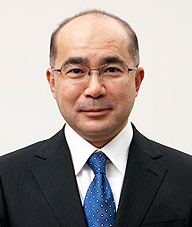Message from Director-General
|
|
October 23, 2014 Tomoyuki Higuchi
Director-General |
The Institute of Statistical Mathematics (ISM) was established in 1944, close to the end of World War II. This year, therefore, marks the 70th anniversary of our founding. The ISM was launched with the aim of conducting studies on the mathematics of probability and its applications, as well as of communicating, unifying, and promoting such studies. To this day, without interruption, the same determined spirit of inquiry that was directed to research in those early years has been preserved in our identity, enabling us to make contributions to expanding the depth and advancing the frontiers of statistical mathematics. With two years remaining of our 2nd Medium-term Plan as an Inter-university Research Institute Corporation, we must face the challenging environment surrounding national universities and also this year accelerate our preparations for transitioning to the 3rd term.
This 2014-2015 Japanese academic year will be the final year of my (first four-year) term as Director-General. I was appointed amid the confusion that followed the Great East Japan Earthquake — the youngest person ever to take on the job — and to the best of my abilities, I strived to get our two major projects at the institute, the Network Of Excellence (NOE) Project and the Project for Fostering and Promoting Statistical Thinking, fully up and running and to ensure the stable operation of the institute.
The three key focal points of operation in this academic year are (1) advancing our inter-university and cooperative research functions, (2) enhancing our organizational capacity, and (3) formulating a first draft for our 3rd Medium-term Plan.
Within the first half of this academic year, we have introduced three supercomputer systems, each equipped with different functions, in part with the help of supplementary budget funds. One of these supercomputers is to be part of Japan’s revolutionary High-Performance Computing Infrastructure (HPCI), a key component of Japan’s national computing infrastructure. ISM is the first Inter-university Research Institute to join HPCI. We are intent on systematically utilizing the three systems, in accordance with the diverse skills and purposes of users, and to efficiently promote their use for inter-university and cooperative research. In addition, we plan to start construction on an extension of our guesthouse (to increase the number of apartments), which has proved so fruitful in helping us to host prominent researchers from abroad.
To enhance our organizational capacity, with budget funds from the program for promoting the enhancement of research universities by the Ministry of Education, Culture, Sports, Science and Technology, we are investing effort in ensuring the stable operation of a group of University Research Administrators (known as URAs) appointed in November of last year to function as support enhancing research at ISM. We will conduct a drastic overhaul of our public relations system, which has been inadequate. Utilizing this URA human resource team, we will aim for the realization of public relations activities that are more efficient and of higher quality. We recognize that with all the current public attention on “big data” and statistical science the role of public relations is extremely vital. Although statistical mathematics is difficult to understand and unapproachable to most people, because our research plays an important role in society, we are committed to communicating and explaining what we do in an approachable way.
In April of this year, a large commercial facility was built on vacant land close to ISM and within about one and a half years, another large commercial facility is expected to be constructed nearby. Clearly, this is one of the fastest growing parts of the western half of Tokyo. With the influx of many new restaurants, the variety of meals is greatly expanding, making life much more convenient for visitors staying at our guesthouse. ISM can take advantage of this trend to strengthen itself as an Inter-university Research Institute, thereby making our contribution to the development of the local economy.
As a research center focused on data-centric science, in the face of fierce global competition, we remain dedicated to meeting the expectations of society through the coordinated efforts of all our personnel. We look forward to your continued understanding and support in this mission.




